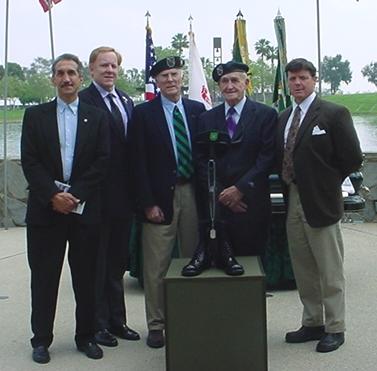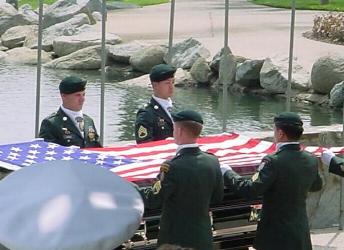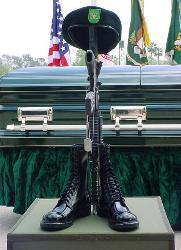Col. (Ret) Aaron Bank

Biography of Colonel (R) Aaron Bank
Honorary Colonel of the 1st Special Forces Regiment
Col. (Ret) Aaron Bank

Biography of Colonel (R) Aaron Bank
Honorary Colonel of the 1st Special Forces Regiment
Aaron Bank was born 23 November 1902, in New York City. Before entering the US Army in 1939, he traveled extensively in Europe becoming fluent in French and German. In 1943, after completing Officer Candidate School, Bank volunteered for the Office of Strategic Services (OSS) and was assigned to a Jedburg team.
COL Bank and his team made a combat parachute jump into Southern France in August 1944 where they used hit-and-run tactics to harass the Germans as they withdrew up the Rhone River. COL Bank was awarded the Croix de Guerre by the French and the Bronze Oak Leaf Emblem for being mentioned in dispatches by the British for his actions.
Later, COL Bank was chosen as the commanding officer for Operation Iron Cross, a high risk undertaking to snatch Hitler and key members of his close circle should they retreat to the "National Redoubt" in the Bavarian Alps. Bank recruited a company-size unit of anti-Nazi Germans, most of whom were POWs and communist sympathizers, found in French POW camps. They were to operate as an ersatz German mountain infantry company. All training was done in German and the men all wore German uniforms and carried German weapons. The mission was however, never launched. Bank got word that the operation was aborted while he and his unit were on the tarmac in Austria waiting to board the C-47s that were to drop them into the area.
After the aborted Iron Cross mission, Bank was transferred to Indochina to search for Japanese POW Camps around the Vientiane-Laos area. For this action, he received the Soldier's Medal. His team located 143 French civilian internees at Naung Kai, 14 French internees at Vientiane, and eight French internees at Thakhek., supplying all with medical supplies and special food items for the numbers of children held in the camps.
After the end of the war, Bank commanded the Regional Counter-Intelligence Corps in Germany. He then went to the Far East and served as the executive officer of the 187th Regimental Combat Team in Korea. "When you were assigned as Liaison Officer and Civil Affairs Officer of the 187th Airborne Regimental Combat Team during the early phases of the Korean emergency," GEN Maxwell Taylor wrote in a letter to COL Bank on the advent of his retirement, "you facilitated the operations of your command against the Communists by your sound administration of occupied areas, particularly the City of Pyongyang."
It was Aaron Bank's next assignment as the Chief of the Special Operations Branch under the Office of the Chief of Psychological Warfare that had a profound impact on Special Operations Forces' history. MG Robert A. McClure, Bank's commanding officer, instructed Bank to staff and obtain Army approval for the creation of an OSS Operational Group-style unit. Bank's diligence was rewarded in 1952 when the Army approved 2,300 military personnel spaces for a Special Forces organization - the 10th Special Forces Group (Airborne).
The broad mission of the new unit was to infiltrate by land, sea or air, deep into enemy occupied territory and organize the resistance guerrilla potential to conduct Special Forces operations with the emphasis on guerrilla training.
Bank assumed command of a hand picked staff of eight men at Fort Bragg, North Carolina on 19 June 1952. The 10th Special Forces Group (Airborne) [SFG(A)] was activated the next day. "We had no precedent, no manuals," Bank said in an interview in 1982. "Herb Brucker and I developed our own program - the Army left us alone. We didn't just take the Airborne, but the cream of the Airborne - the hard-bitten troopers who were willing to take calculated risks and face challenges that conventional units need never be concerned with."
While many of the volunteers came from the OSS, the First Special Service Force, Merrill's Marauders or the Airborne Ranger Companies that fought in Korea, others volunteered under the Lodge Bill.
These men were primarily Eastern Europeans from Soviet satellite countries who had been herded into Germany by the Nazis as slave laborers and had remained in Western Europe as refuge The Lodge Bill permitted their enlistment in the U.S. Army and offered citizenship after two years of honorable military service. These men proved to be highly valuable as they not only spoke the language, but were also thoroughly familiar with the customs, political sentiments and ideology. The following year, spurred by the sudden revolt in the East Berlin sector of East Germany, the 10th Special Forces (SF) Group split into two SF units; the 10th and 77th SFG(A)s. Bank moved the 10th SF Group to Bad Toelz, Federal Republic of Germany. The Pentagon realized they had a unit which was trained to utilize what they considered to be a "ghost army" - the underground resistance in Eastern Europe. During the next year, COL Bank briefed his mission to every senior commander in USAREUR and by the time he left, had ensured the inclusion of the 10th SFG(A) in all war plans.
When he left the 10th SFG(A), he remained in Europe, serving as the Chief of the Plans and Operations Division of the Seventh Army. He returned stateside in 1957 where he served his final assignments with the Department of the Army Staff, first with the Regular Army Augmentation Board and then with the Special Officer's Screening Board, Chief of Staff of Personnel. COL Bank retired on 28 January 1958.
COL Bank was named Honorary Colonel of the I st Special Forces Regiment on I December 1986. During the last twenty years, he wrote two books: From the OSS to Green Berets, a non-fictional account of his career, and a novel Knight’s Cross, with EM Nathanson, the author of The Dirty Dozen.
COL Bank's awards include the Army Distinguished Service Medal, Soldier's Medal, Bronze Star Medal, American Campaign Medal, Asia-Pacific Campaign Medal with bronze campaign star, Europe-Asia-Middle East Campaign Medal with bronze campaign star, World War Victory Medal, Army of Occupation Medal, National Defense Service Medal, Korean Service Medal, China War Memorial Badge and ribbon, Combat Infantryman's Badge, Senior Parachutist Badge with combat star, and Special Forces Tab.
The funeral and Honors in Memory of
COL (Ret) Aaron Bank
Riverside National Cemetery
1:00 p.m. April 5, 2004

In Respect for Aaron Bank; Bob, Erick, Jim, John, & Mike



Riverside National Cemetery
With Respect,
Robert R. Iannello, DDS
Major, USMC (Ret.)
In Memory of Jim Eubank
My Home Page
In Memory of Robert Scoles
My Rebreather Page